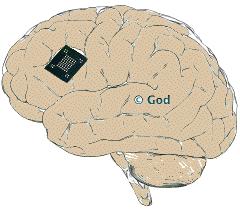Tag: Brain
The Effects of Music on the Brain
1 in 4 would be happy with ‘brain implants’
Scientists urge Government to back brain-computer technology
First gene map of the human brain shows all our squidgy think-boxes to be 94% similar
The first comprehensive gene mapping of the human brain has been carried out by the The Allen Institute for Brain Science, showing that our think-boxes are far more similar than anyone first thought. Working with two normal adult brains, the…
How much is your brain worth? Use this equation to find out…
Take a look at this formula: T = 40 M i K e (3e +M) (e +50M) / {(e2 +3M e +M2) (e +100M)} Mean anything to you? Well it apparently holds the key to as much as £30,000…
Brain training games do not make you smarter – FACT
Nicole Kidman may have been fooled by its cute brain teasing charms, but Tech Digest were never truly convinced. Now there's proof: new research shows that brain training games do not improve your IQ. A scientific study of 11,430…
Scientists develop "Sex Chip" to stimulate pleasure in the brain
Technology previously used to treat Parkinson’s Disease has been directed elsewhere. Scientists claim to have developed a chip that can be implanted into the brain and used to deliver “feelings of pleasure”.
The target of the chip is the Orbitofrontal Cortex. Just behind the eyes, it’s the bit of your noggin that’s associated with pleasure derived from food and sex. The implementation is still a bit clunky at the moment – you have to run a wire from the chip in the brain to a heart pacemaker, which I imagine isn’t too comfortable. Neurosurgery professor Tipu Aziz, said:
“There is evidence that this chip will work. A few years ago a scientist implanted such a device into the brain of a woman with a low sex drive and turned her into a very sexually active woman. She didn’t like the sudden change, so the wiring in her head was removed.”
(via the Telegraph)
Related posts: Sexy dancing robot ladies look at you, in some clever artistic commentary on CCTV society | Philips Intimate Massager collection – sex toys (no laughing)
MONKEY uses its BRAIN to control a ROBOTIC ARM
More news from the world of mad scientists PLAYING GOD – this time they’ve managed to thoroughly confuse a poor monkey by hooking its brain up to robotic arm.
The serious research angle behind the monkey/robot/brain fun is something to do with it eventually being used to help humans control prosthetic limbs. So far, the boffins at the University of Pittsburgh School of Medicine have managed to teach a monkey to pick up a marshmallow and put it in its mouth. Here is the dramatic moment in pictures:
This development in marshmallow consumption alone…
Robots to take over the world! Or, perhaps, just help you solve The Times' crossword
 Relax! Intelligent robots and computers aren’t going to take over the human race ((at least, I don’t think so), but they are likely to get a lot more advanced, and could well end up providing a built-in intelligence boost for us mere mortals.
Relax! Intelligent robots and computers aren’t going to take over the human race ((at least, I don’t think so), but they are likely to get a lot more advanced, and could well end up providing a built-in intelligence boost for us mere mortals.
According to Ray Kurzweil — one of 18 influential thinkers chosen by the US National Academy of Engineering to identify the great technological challenges facing humanity in the 21st century — by the year 2029, machines will have artificial intelligence as advanced as humans.
(Or the year 2016 to match Sun readers. Ouch! Kidding!)
















